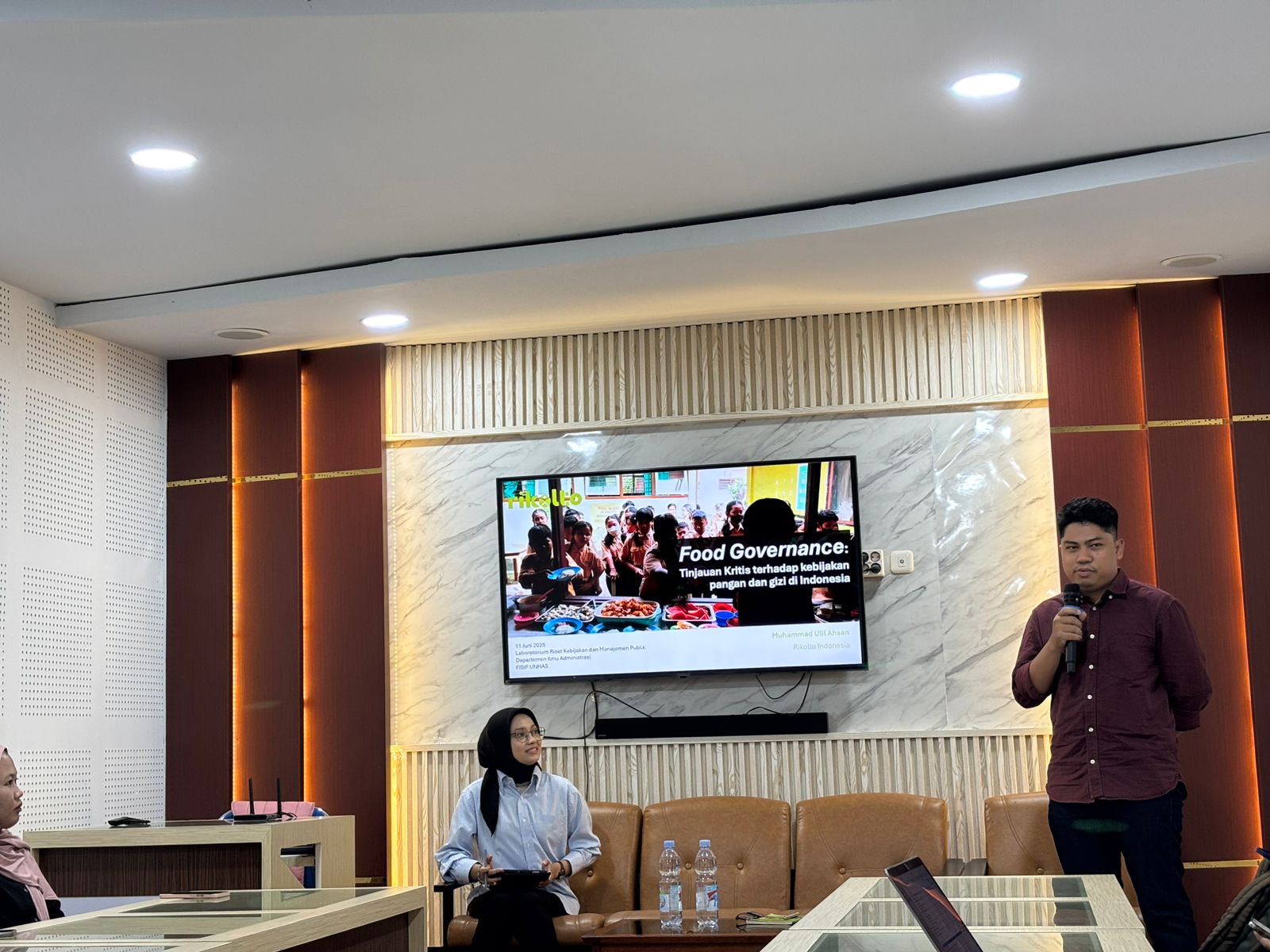Faculty of Social and Political Sciences Policy Laboratory UNHAS, Critically Examining Food and Nutrition Security Policies in Indonesia

Makassar – The Department of Administrative Sciences, FISIP UNHAS together with the Public Policy and Management Research Laboratory (LRKMP) again held the “Governance Perspective” series on Wednesday (11/6/2025), presenting Muhammad Ulil Ahsan, Program Coordinator of Good Food for Cities, Rikolto Indonesia, as the main speaker. In his presentation, Ulil delivered a critical analysis of Indonesia’s food and nutrition policies, which were considered to be still fragmented and not yet rooted in a systemic and participatory approach.


Food, Nutrition and Systemic Inequality
Ulil Ahsan opened the session by explaining various crucial issues in national food governance by highlighting the high stunting rate (21.6% in 2023), the prevalence of obesity in school-age children (1 in 5 children), and the conversion of rice fields reaching 100,000 hectares per year. Ironically, amidst various state interventions, Indonesia is still one of the largest producers of food waste in the world (21 million tons per year - UNEP, 2021), and relies on imports of staple foods such as wheat, sugar, and soybeans.
In his analysis, Ulil highlighted the "Food Regime" and "Nutrition Transition" frameworks as lenses for understanding how global political and corporate forces shape unhealthy consumption patterns and exacerbate the dual nutritional crisis: obesity and malnutrition in one population. The proposed food policies such as "Free Nutritious Meals" are considered to have minimal public participation, are not technically ready, and carry a high risk of inefficiency.
Academic Response: Food Security Needs a Holistic Approach
The discussion emerged when academics also responded to the material presented.
Prof. Dr. Alwi, M.Si, Professor of Policy Network, highlighted the contradictory reality where people still like to buy, not produce. For that reason, it is important that socialization about healthy food can be an alternative strategy to strengthen local-based food security.
Meanwhile, Prof. Dr. Deddy T. Tikson emphasized the need to see MBG (Free Nutritious Meals) as part of a school-based food policy, by referring to a holistic model such as in the United States. He emphasized the importance of partnerships between academics and practitioners through the Participatory Action Research (PAR) approach to create more inclusive and responsive food governance.
Another discussion participant, Baharuddin Solongi, M.Si as a practitioner and consultant for regional development programs, emphasized the importance of program design that involves various parties and the commitment of local governments to encourage program sustainability. Likewise, Dr. Nani Harlinda Nurdin, an academic and practitioner of village development, emphasized the importance of looking at the local context in program implementation and not simply implementing the program uniformly, t. This is because each region has a different context. Ulil further responded that food policies should provide space for local initiatives by utilizing healthier local food resources sourced from local farmers.
School Food Management: Good Practices from Surakarta
Ulil also presented a case study from the city of Surakarta, where a comprehensive approach to healthy canteens has successfully improved eating patterns, learning concentration, and the quality of school food. With five basic principles – from canteen management to monitoring and evaluation – this model has been replicated and used as a reference for city policy.
Conclusion: It's Time to Repoliticize the Food System
Ending the session, Ulil emphasized that the transformation of the food system must start from the bottom, and not just about the distribution of calories. To that end, Ulil emphasized the importance of a fair, participatory, and sustainable food system. That can only happen if we ask critically: food for whom, by whom, and how?”
This activity was closed with enthusiasm from the participants, both from academics, students, and public policy practitioners. This discussion is a reminder that talking about food is not just about consumption, but about the sustainability of the nation's life.